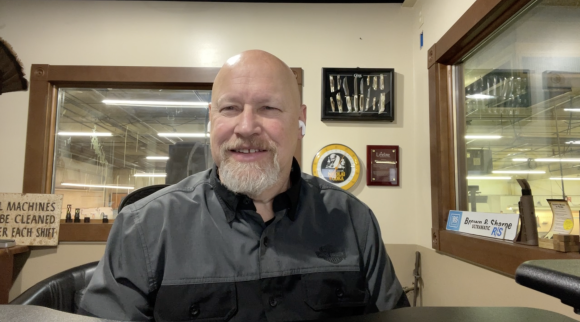Today’s episode is Part II of our interview with Roger Duffy, owner of F&F Machine Products.
In Part I we touched on Roger’s natural entrepreneurial instinct and how he loves to push himself to get out of his comfort zone.
In this episode, we’re delving further into Roger’s business adventures and philosophies.
He believes in a theory he calls the “Goldfish Bowl Syndrome,” which he observed in the growth of his own business. He says a business can be like a little goldfish in a small fish bowl that gets transferred to a large aquarium and quadruples in size when it has space to reach its full potential.
If you haven’t heard Part I (Episode 210) yet, I suggest you go back and listen to it before you go any further.
Facebook: https://www.facebook.com/swarfcast
Instagram: https://www.instagram.com/swarfcast/
LinkedIn: https://www.linkedin.com/company/todays-machining-world
Twitter: https://twitter.com/tmwswarfblog
*************
Link to Graff-Pinkert’s Acquisitions and Sales promotion!
*************
Interview Highlights
Growing His Business Out of Its Goldfish Bowl
When Roger started working at F&F, before he bought out the company’s owner, the shop was in a 5,000-square-foot building with a handful of Brown & Sharpe screw machines. Roger built up the customer base and filled the shop with 32 Brown & Sharpes.
As time went on, the company became more diversified and took on higher precision work. He had to purchase more equipment—modern, high precision machines like CNC slant bed lathes, CNC Swiss, and CNC mills.
More machines necessitated a new larger building. First he considered putting up a 7,500-square-foot building, but he was advised to go larger. In the end, he decided to construct a 20,000-square-foot building. He doubled his number of machines and then doubled again the following year.
Roger likened his business to a little goldfish in a small bowl. When he gave himself room to grow in a larger building, his business flourished like a goldfish that becomes a carp after it is placed in an aquarium. Later on, he bought more properties including a 40,000-square-foot building, which he quickly filled as well.
Learning to Scale his Business and Delegate
Before he became the boss, Roger was on the floor at F&F setting up machines. He says he was really good at the job and liked being on the floor, but he got bored doing one thing too long. Running F&F Machining like a real business was the next challenge he had been itching for.
Roger says he was inspired by the business approach of Andrew Carnegie. He says that Carnegie didn’t make his fortune by being an expert on steel. He made his fortune because he was great at finding and organizing other people who were experts on steel.
Roger reduced his time on the floor. He hired talented people and took the time to train them. He learned to delegate responsibilities and experimented to find the right roles at the company for employees.
Ironically, he still refers to business ownership as “buying a job” because it requires such immense work and responsibility. He cautions against romanticizing “being your own boss.”
I questioned him about the “owning a job” statement. If he had scaled his business and learned to delegate, hadn’t the business matured beyond the stage of “owning a job?”
After a brief pause, Roger agreed that F&F could function without him–at least for a period of time. It’s just that he loves his business. He loves the challenges of growing it. He loves trying new types of work and new types of machines, and nobody is going to care about his business the way he will.
He can’t NOT take it home with him. He wouldn’t want it to be any other way.
Question: What have you done to grow your company over the years?
Podcast: Play in new window | Download



